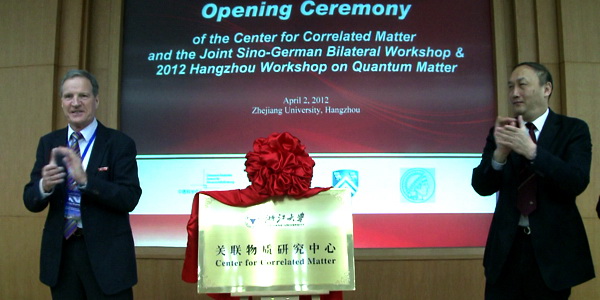In the morning of April 2, 2012, Professor Frank Steglich, the discoverer of the first heavy fermion superconductor and the founding director of Max Planck Institute for Chemical Physics of Solids in Germany, assumed the position of Qiushi distinguished professor and the Director of the newly established Center for Correlated Matter at Zhejiang University. At the opening ceremony of the research center, the University President, Prof. Wei Yang, awarded the letter of appointment to Professor Frank Steglich, and the Vice President Zhaohui Wu announced the document of establishing the Center for Correlated Matter in Zhejiang University.
Correlated matter is an important aspect of Physical Science. Exotic quantum phases and phenomena may emerge from the many body interactions in the correlated matters. “High-temperature superconductivity, fractional quantum Hall effect and quantum phase transitions are just some representations of such correlated effects”, said Prof. Fu-chun Zhang, a member of the National Thousand Talent Program.
Heavy fermion compounds, which mainly present in the lanthanide- and actinide-based materials, are typical correlated matters. The strong electronic coupling between the f-electrons and d-electrons in these compounds largely enhances the effective mass of electrons, which reaches 1000 times higher than that of free electrons. In 1979, for the first time, Prof. Steglich discovered superconductivity in the heavy fermion compound CeCu2Si2, pioneering a new research field of unconventional superconductivity.
Prof. Steglich commented, “Heavy fermion superconductors, iron-based superconductors and copper oxides high temperature superconductors share many similarities. In comparison, heavy fermion compounds exhibit their own unique advantages, such as the low energy scales and tunable ground states, which make them ideal systems for studying the interplay of various quantum states and the associated quantum phase transitions. The experimental research on heavy fermion physics has just started in China. With its past work, Zhejiang University can shape its own features in this research field.”
“Zhejiang University had a good tradition on the study of high-temperature superconductivity. The recent recruitments of several new faculties and the establishment of the Center for Correlated Matter will further strengthen and consolidate our research forces on the study of correlated matter in Zhejiang University”, said Professor Fu-chun Zhang.
Prof. Huiqiu Yuan, the Deputy Director of the Center, described that the center is going to hire another few PIs in the next few years. This will then allow the center to conduct systematic researches on various aspects of correlated matter, including materials developments, characterizations of physical properties using various advanced techniques and theoretical supports. Except the subject of heavy fermion physics, the center will also devote to other topics of correlated matter, e.g., high temperature superconductivity, quantum phase transitions, topological states and so on.
Following the opening ceremony, a joint “Sino-German Bilateral Workshop on Emergent Phases in Correlated and Topological Matter” and “2012 Hangzhou Workshop on Quantum Matter” was successfully held in Zijingan Campus on April 2-6. More than 100 participants attended the joint workshops, 56 of which were invited speakers from 10 countries. The workshop was featured with many high quality talks on unconventional superconductivity, quantum phase transitions, topological insulators and superconductivity, given by internationally prestigious scientists. The Sino-German bilateral workshop was financially supported by Sino-German Center for Research Promotion, and the 2012 Hangzhou workshop is co-sponsored by Zhejiang University and Rice University.




